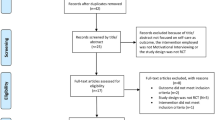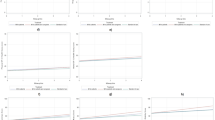Abstract
Background
Heart failure (HF) hospitalization is an expensive healthcare utilization event. Motivational interviewing (MI) has been studied for effects on HF self-management behaviors.
Objective
The objective of this systematic review was to conduct an exploration and report of evidence and gaps in the literature regarding the impact of MI on HF outcomes.
Data Sources
A modified Cochrane systematic review was conducted via a literature search in the MEDLINE, CINAHL, Cochrane Collaborative Systematic Reviews, PsycINFO, Health Source: Nursing/Academic Edition, and Google Scholar databases.
Study Eligibility Criteria, Participants, and Interventions
Randomized controlled trials (RCTs) or controlled experimental studies published in English from January 1990 to February 2019 that included adults (18 years and older) diagnosed with HF New York Heart Association (NYHA) class I, II, II, or IV were eligible for inclusion. Interventions evaluated were an MI-based face-to-face communication or telephone-based conversation provided by any healthcare provider type.
Study Appraisal and Synthesis Methods
The Cochrane method for assessing risk of bias was used to analyze the methodological quality of retained studies.
Results
Of 167 initial articles, nine were retained, describing eight unique studies (758 total patients, range 30–241; age range 58–79 years; attrition range 13–36%). The impact of MI was examined for general self-care behaviors (SCBs) (physical activity specifically), quality of life (QoL), and/or hospital readmission prevention. Eight of nine articles reported a positive impact of MI over advice-giving, seven being statistically significant. MI interventions used an initial face-to-face encounter with three to five follow-up telephone encounters.
Limitations
This systematic review had the following limitations: most retained studies included intervention activities conducted in hospital/clinic settings, which limits generalizability of the intervention in other care settings; intervention fidelity, blinding, selection, interventionist training, and random assignment were not clear in all studies; retained studies did not include potential covariates such as health literacy, patient age, and perception of disease/health risks; and some retained studies relied on patient self-report of outcomes, which may introduce recall or social desirability bias.
Conclusions and Implications of Key Findings
MI demonstrated a positive effect on the SCB hospital readmission prevention factor and on QoL. MI delivered with greater frequency and over a longer duration may improve the immediate risk of hospital readmission as well as long-term outcomes through better medication adherence and SCBs. However, heterogeneity in the methods, design, intervention type, and structure challenged comparisons across studies and further research is warranted.

Similar content being viewed by others
References
American Heart Association. What is Heart Failure?, https://www.heart.org/en/health-topics/heart-failure/what-is-heart-failure (2019, Accessed 17 Mar 2019).
Ambrosy AP, Fonarow GC, Butler J, et al. The global health and economic burden of hospitalizations for heart failure: lessons learned from hospitalized heart failure registries. J Am Coll Cardiol. 2014;63:1123–33.
Benjamin EJ, Blaha MJ, Chiuve SE, et al. Heart disease and stroke statistics-2017 update: a report from the American Heart Association. Circulation. 2017;135:e146–603. https://doi.org/10.1161/CIR.0000000000000485.
Cook C, Cole G, Asaria P, Jabbour R, Francis DP. The annual global economic burden of heart failure. Int J Cardiol. 2014;171:368–76.
Ross JS, Chen J, Lin Z, et al. Recent national trends in readmission rates after heart failure hospitalization. Circ Hear Fail. 2010;3:97–103.
Kannel WB. Vital epidemiologic clues in heart failure. J Clin Epidemiol. 2000;53:229–35.
Brodie DA, Inoue A. Motivational interviewing to promote physical activity for people with chronic heart failure. J Adv Nurs. 2005;50:518–27.
Board A. 2,573 hospitals will face readmission penalties this year. Is yours one of them? 2017. https://www.advisory.com/daily-briefing/2017/08/07/hospital-penalties.
Rabelo ER, Aliti GB, Goldraich L, Domingues FB, Clausell N, Rohde LE. Non-pharmacological management of patients hospitalized with heart failure at a teaching hospital. Arq Bras Cardiol. 2006;119:986–90.
Miller WR, Rollnick S. Motivational interviewing: preparing people to change addictive behavior. 3rd ed. New York: The Guilford Press; 2013.
Kavookjian J. Motivational interviewing. In: Richardson M, Chant C, Chessman KH, Finks SW, Hemstreet BA, Hume AL, et al., editors. Pharmacotherapy self-assessment program, 7th ed. Book 8: science and practice of pharmacotherapy. Lenexa: American College of Clinical Pharmacy (ACCP); 2011.
Rollnick S, Miller WR, Butler CC. Motivational interviewing in health care. New York: The Guilford Press; 2008.
Inamdar A, Inamdar A. Heart failure: diagnosis, management and utilization. J Clin Med. 2016;5:62.
Lundahl B, Moleni T, Burke BL, et al. Motivational interviewing in medical care settings: a systematic review and meta-analysis of randomized controlled trials. Patient Educ Couns. 2013;93:157–68.
Martins RK, McNeil DW. Review of motivational interviewing in promoting health behaviors. Clin Psychol Rev. 2009;29:283–93.
Hill S, Kavookjian J. Motivational interviewing as a behavioral intervention to increase HAART adherence in patients who are HIV-positive: a systematic review of the literature. AIDS Care. 2012;24:583–92.
Ekong G, Kavookjian J. Motivational interviewing and outcomes in adults with type 2 diabetes: a systematic review. Patient Educ Couns. 2016;99:944–52.
Jiang Y, Shorey S, Seah B, Chan WX, Tam WWS, Wang W. The effectiveness of psychological interventions on self-care, psychological and health outcomes in patients with chronic heart failure—a systematic review and meta-analysis. Int J Nurs Stud. 2018;78:16–25.
Navidian A, Mobaraki H, Shakiba M. The effect of education through motivational interviewing compared with conventional education on self-care behaviors in heart failure patients with depression. Patient Educ Couns. 2017;100:1499–504.
Paradis V, Cossette S, Frasure-Smith N, Heppell S, Guertin M-C. The efficacy of a motivational nursing intervention based on the stages of change on self-care in heart failure patients. J Cardiovasc Nurs. 2010;25:130–41.
Riegel B, Masterson Creber R, Hill J, Chittams J, Hoke L. Effectiveness of motivational interviewing in decreasing hospital readmission in adults with heart failure and multimorbidity. Clin Nurs Res. 2016;25:362–77.
Chen J, Zhao H, Hao S, Xie J, Ouyang Y, Zhao S. Motivational interviewing to improve the self-care behaviors for patients with chronic heart failure: a randomized controlled trial. Int J Nurs Sci. 2018;5:213–7.
Masterson Creber R, Patey M, Lee CS, Kuan A, Jurgens C, Riegel B. Motivational interviewing to improve self-care for patients with chronic heart failure: MITI-HF randomized controlled trial. Patient Educ Couns. 2016;99:256–64.
Shively M, Kodiath M, Smith TL, et al. Effect of behavioral management on quality of life in mild heart failure: a randomized controlled trial. Patient Educ Couns. 2005;58:27–34.
Vaillant-Roussel H, Laporte C, Pereira B, et al. Impact of patient education on chronic heart failure in primary care (ETIC): a cluster randomised trial. BMC Fam Pract. 2016;17:80.
Brodie DA, Inoue A, Shaw DG. Motivational interviewing to change quality of life for people with chronic heart failure: a randomised controlled trial. Int J Nurs Stud. 2008;45:489–500.
Al-Ganmi AH, Perry L, Gholizadeh L, Alotaibi AM. Cardiovascular medication adherence among patients with cardiac disease: a systematic review. J Adv Nurs. 2016;72:3001–14.
Thompson DR, Chair SY, Chan SW, Astin F, Davidson PM, Ski CF. Motivational interviewing: a useful approach to improving cardiovascular health? J Clin Nurs. 2011;20:1236–44.
Stawnychy M, Masterson Creber R, Riegel B. Using brief motivational interviewing to address the complex needs of a challenging patient with heart failure. J Cardiovasc Nurs. 2014;29:E1–6.
Falk H, Ekman I, Anderson R, Fu M, Granger B. Older patients’ experiences of heart failure—an integrative literature review. J Nurs Scholarsh. 2013;45:247–55.
Hyrkas K, Wiggins M. A comparison of usual care, a patient-centred education intervention and motivational interviewing to improve medication adherence and readmissions of adults in an acute-care setting. J Nurs Manag. 2014;22:350–61.
Linden A, Butterworth SW. A comprehensive hospital-based intervention to reduce readmissions for chronically ill patients: a randomized controlled trial. Am J Manag Care. 2014;20:783–92.
Madson MB, Loignon AC, Lane C. Training in motivational interviewing: a systematic review. J Subst Abuse Treat. 2009;36:101–9.
Chair SY, Chan SWC, Thompson DR, Leung KP, Ng SKC, Choi KC. Long-term effect of motivational interviewing on clinical and psychological outcomes and health-related quality of life in cardiac rehabilitation patients with poor motivation in Hong Kong: a randomized controlled trial. Clin Rehabil. 2013;27:1107–17.
Rubak S, Sandbaek A, Lauritzen T, et al. Motivational interviewing: a systematic review and meta-analysis. Br J Gen Pract. 2005;55:305–12.
Sineath A, Lambert L, Verga C, Wagstaff M, Wingo BC. Monitoring intervention fidelity of a lifestyle behavioral intervention delivered through telehealth. mHealth 2017;3:35–35.
Boland MRS, Kruis AL, Tsiachristas A, et al. Cost-effectiveness of integrated COPD care: the RECODE cluster randomised trial. BMJ Open. 2015;5:e0072845. https://doi.org/10.1136/bmjopen-2014-007284.
Simpson SA, McNamara R, Shaw C, et al. A feasibility randomised controlled trial of a motivational interviewing-based intervention for weight loss maintenance in adults. Health Technol Assess. 2015;19:v-vi, xix-xxv, 1-378. https://doi.org/10.3310/hta19500.
Xu X, Yonkers KA, Ruger JP. Economic evaluation of a behavioral intervention versus brief advice for substance use treatment in pregnant women: results from a randomized controlled trial. BMC Pregnancy Childbirth. 2017;17:1–8.
Larsen MH, Wahl AK, Krogstad AL, Aas E. Cost-utility analysis of supported self-management with motivational interviewing for patients with psoriasis. Acta Derm Venereol. 2016;96:664–8.
Shepard DS, Lwin AK, Barnett NP, et al. Cost-effectiveness of motivational intervention with significant others for patients with alcohol misuse. Addiction. 2016;111:832–9.
Mash R, Kroukamp R, Gaziano T, Levitt N. Cost-effectiveness of a diabetes group education program delivered by health promoters with a guiding style in underserved communities in Cape Town, South Africa. Patient Educ Couns. 2015;98:622–6.
Acknowledgements
The authors would like to thank Ms. Adelia Grabowsky, Librarian, Auburn University for her support in the literature search process. And special thanks to Dr. Lindsey Hohmann for her feedback and editing of the manuscript.
Author information
Authors and Affiliations
Contributions
Dr Jan Kavookjian, Associate Professor of Health Outcomes Research and Policy in the Harrison School of Pharmacy at Auburn University, is senior author and corresponding author. Dr Kavookjian directed the work, taught the modified Cochrane systematic review process to Nabin Poudel, was the second researcher for the separately conducted full-text review tier and discussion to consensus for retain/reject decisions, wrote a majority of the Methods section, wrote significant portions of the Discussion section, gave writing edits to the entire manuscript, and prepared and conducted the manuscript submission. Nabin Poudel, BPharm and PhD student in Health Outcomes Research and Policy, is first author, having completed the directed formulation of the research question, completed the directed search and review, completed the directed data extraction and results tables preparation, composed the literature review and narrative for the Introduction section, composed portions of the methods section, composed the initial results and discussion sections. Michael J. Scalese, PharmD, BCCP, BCPS, CACP, Cardiology Clinical Pharmacist and former faculty member in the Harrison School of Pharmacy at Auburn University, served as the clinical expert in each step of the project. He directed the clinical aspects of the research question development, wrote portions of the Introduction section, helped interpret and wrote portions of the Results and Discussion sections, and provided edits to the full manuscript.
Corresponding author
Ethics declarations
Funding
No funding contracts or grants, nor honoraria, were received for the completion of this work.
Conflict of interest
Dr Kavookjian discloses that she is on the Merck Speakers Bureau for non-product medical education for the topics of motivational interviewing, shared decision-making, and health literacy communication; she also reports that she serves as a consultant for Merck for motivational interviewing content in the person-centered communication line of education materials; she also consults for MediMergent, LLC for its US Food and Drug Administration (FDA)-funded project in training pharmacists in motivational interviewing for medication adherence in diabetes. Nabin Poudel and Dr Michael Scalese declare that they have no conflicts of interest or financial disclosures.
Data Availability Statement
All data generated or analyzed during this systematic review study are included in this published article and Electronic Supplementary Material 1 Search Strategy Results.
Electronic supplementary material
Below is the link to the electronic supplementary material.
Rights and permissions
About this article
Cite this article
Poudel, N., Kavookjian, J. & Scalese, M.J. Motivational Interviewing as a Strategy to Impact Outcomes in Heart Failure Patients: A Systematic Review. Patient 13, 43–55 (2020). https://doi.org/10.1007/s40271-019-00387-6
Published:
Issue Date:
DOI: https://doi.org/10.1007/s40271-019-00387-6




